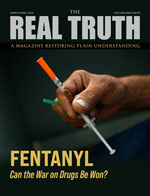In Proverbs 6:16-19, an overlooked and misunderstood series of verses describe six things that God hates. Verse 16 introduces the subject and lays the groundwork for what follows: “These six things does the Lord hate: yes, seven are an abomination unto Him:” The last part of this verse means that the seventh item is an abomination to God. Thus, He hates all six things listed, but He especially hates the seventh one because it involves satanic scheming.
These seven actions or behaviors are: (1) A proud look, (2) a lying tongue, (3) hands that shed innocent blood, (4) a heart that devises wicked imaginations, (5) feet that are swift in running to mischief, (6) a false witness who speaks lies, and (7) one who sows discord among brethren.
Let’s carefully examine these verses and look at some examples of behavior that fit each category.
“A proud look”
Have you noticed the expression on the faces of those who model clothing or jewelry on TV commercials? Usually, it is a “turned off, tuned out,” “better than you” look that perfectly portrays the essence of pride—a proud look. The expressions on the faces of singers or musicians are much the same. Often, these reflect a prideful gaze that translates into, “I’m important,” “I don’t have time for you,” or “Am I not the ultimate VIP to grace you with my presence?”
Such facial expressions are seen throughout society. Much of it is learned behavior, as youths try to mimic rock stars or sports stars they idolize. With others, that turned-off sneer is the only expression they know! To have an innocent, objective, sincere look would cause one to stand out as being na√Įve or inexperienced, which often invites ridicule. For this reason, those who consider themselves “street smart” will freely radiate pride and conceit—but will not dare to be seen wearing a smile!
On the other hand, it is possible that a proud look could only exist in the eye of the beholder. Have you ever been accused of snubbing someone, when such was the farthest thing from your mind? This shows that we should always be careful about attributing this action to others. This said, there are many instances in which pride is unmistakably obvious.
Luke 11:34 sheds some interesting light on one’s eyes or facial expression. The Phillips translation states, “The lamp of your body is your eye: when your eye is sound, your whole body is full of light; but when your eye is evil, your body also is full of darkness.” The Greek word translated as “sound” in this verse can also mean sincerity and generosity. If your eye transmits this signal of sincerity, generosity and wholeheartedness—instead of the “turned-off,” “better than you” resentful gaze—then you are far more in harmony with God’s Way. Recognize and avoid a proud look—God hates it.
(1) What is the eventual outcome of one who radiates pride? Proverbs 16:18.
“A lying tongue”
This describes someone who continually lies or exaggerates. With many, lying becomes a habitual way of life. Such a habit might begin by telling a story about “the fish that got away,” but becomes ingrained as a way of getting others to accept or listen to what one has to say.
The problem with the habitual liar is that he often gets caught in the conflicting accounts of his story. One advantage of always telling the truth is that you do not have to remember what you said, to whom you said it and when. Those caught up in the habit of lying often wind up telling the same person different versions of the same story. At that point, they are “caught in the act.” When you hear someone do this, just remember how much easier it is to simply tell the truth under any circumstance. Although TV sit-coms (which are not worth watching in the first place) routinely make a joke of lying, God does not view this as humorous.
It is important to avoid the habit of exaggerating in the first place. Those who fall into this do so in the hopes of becoming noticed or being appreciated by others. Just remember, if your friends or associates do not accept you as you are, they will not suddenly find you acceptable due to your exaggerated accounts. If they are true friends, outlandish achievements will not make any difference to them. Avoid the pitfall of relying on exaggerations to gain acceptance. It simply never works.
Proverbs 12:19 states, “The lips of truth shall be established for ever: but a lying tongue is but for a moment.” Any “benefit” that comes from lying will not last. But speaking the truth lays foundations that will last forever.
(2) What is the ultimate fate of those who continue to lie as a way of life? Revelation 21:8.
“Hands that shed innocent blood”
This involves attacking an innocent passerby in order to satisfy envy, prejudice, suspicion or perhaps because he is not prepared to defend himself. Such action was once restricted to schools, where bullies sought defenseless children to parade their “superiority” over them.
While this still occurs in schools, such violence has spread to include extortion, robbery and murder. School and drive-by shootings became more common in the 1990s.
As a side note, we have seen Islamic factions nurture and train their youth to become suicide bombers—to kill as many innocent people as possible. Thriving on revenge, these embittered people prize the opportunity to murder innocent men, women and children.
God hates this kind of action and mindset. What was once a rare tactic of bullies has virtually become a sport the world over, in seeking to destroy innocent passengers, workers and bystanders. Proverbs 1:11 focuses on this carnal mindset: “If they say, come with us, let us lay wait for blood, let us lurk privily for the innocent without cause.”
(3) What is the eventual outcome of those who choose this path? Proverbs 1:16-18.
“A heart that devises wicked imaginations”
This involves fabricated accusations used to destroy someone’s credibility. Romans 1:30, which lists wicked traits of those who deny God, specifically mentions “inventors of evil things.” God has given mankind creative abilities to plan and design things just as He does. Unfortunately, some use this ability in a perverted way, instead of using such creative powers to build, improve and beautify as God intended.
(4) Do those who devise wicked thoughts use this to destroy their victims? Isaiah 32:7.
“Feet that are swift in running to mischief”
This involves the tendency to follow a mob mentality, which leads people to loot stores during power outages or weather disasters. It also leads soccer fans to brawl with fans of opposing teams.
It is common to see entire professional sports teams involved in brawls. Even parents of little league teams get into fights with each other. They attack the referees or even their own team’s coach. Often, people will run to witness such spectacles, rather than try to maintain or restore peace.
Consider one trend: When teams win a sports title, such as the Super Bowl or World Series, the celebrations following the victory sometimes turn into riots. Cars are burned and storefronts vandalized by intoxicated, celebrating sports fans. When the participants are interviewed in the wake of the riots, they express that they did nothing out of the ordinary—“after all,” they insist, “this is how one celebrates nowadays.”
(5) What does God say about participating in riots? Exodus 23:2.
“A false witness that speaks lies”
This includes someone who, acting as a witness, twists or perverts the truth. (Note that we have already covered the related point of a lying tongue. This point is an advanced application of lying.) Although this action is closely related to someone who fabricates an accusation, it specifically applies to one who lies as a public witness.
(6) What does God say about the fate of false witnesses? Proverbs 19:5, 9.
“He that sows discord among brethren”
This reflects the cunning and conniving nature of Satan—and is why God calls such actions an abomination. Sowing discord among brethren involves a combination of traits, including deceitfulness.
Notice Proverbs 6:14: “Frowardness is in his heart, he devises mischief continually; he sows discord.” Frowardness is an old English word that means “stubbornly contrary and obstinate.”
Sowing discord splits friendships and causes factions. Notice Proverbs 16:28: “A froward man sows strife: and a whisperer separates chief friends.”
Proverbs 17:9 states, “He that covers a transgression seeks love; but he that repeats a matter separates very friends.” People who pass vicious rumors could unintentionally be sowing discord. Spreading rumors is one of numerous ways one can play into the hands of those who sow discord.
(7) Who are usually the victims of those who wickedly scheme and plot? Psalm 37:12.
All seven of the actions covered in this Bible study are intertwined in numerous ways. Identify, resist and learn to hate such impulses—just as God does.


















